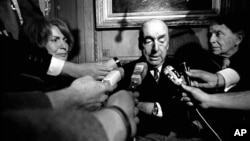The government of Chile, which is probing the 1973 death of Nobel laureate Pablo Neruda, says it is "highly probable" the revered poet, diplomat and avowed communist died as a result of "third-party intervention" days after a coup that brought General Augusto Pinochet to power.
But Chile's Interior Ministry, in a statement, also cautioned that an investigation begun in 2011 was not yet complete and that no formal conclusions had yet been reached that contradicted earlier findings that Neruda, who suffered from cancer, died of natural causes.
The government statement followed a report in the Spanish daily El Pais that included an Interior Ministry document on Neruda's death. The March 25, 2015, document said in part, "The poet was injected with a painkiller that produced the cardiac arrest that would cause his death."
Quoting from the report, The New York Times said Saturday that the document assigned no ulterior motive for administering the drug, which was injected directly into Neruda's abdomen rather than intravenously. It said it was not clear who administered the drug, but that the abdominal procedure was unusual in a medical center.
It has been widely reported that Neruda was traumatized by the September 11, 1973, coup that toppled Marxist President Salvador Allende and brought Pinochet to power. Allende, under siege at the presidential palace, is believed to have committed suicide rather than surrender to rebel forces.
Official inquiries have found that thousands of Chileans were tortured, disappeared or slain during the Pinochet reign, which ended in 1990.
Days before his death, Neruda told colleagues he planned to go into exile to speak out against the new military government. He died one day before he could flee.
Controversy surrounding Neruda's death remained so strong in Chile that the government ordered his body exhumed in 2013 for examination.
Authorities said testing revealed no signs of poisoning, but his family and chauffeur requested further investigation for substances not looked for in the earlier tests.
Neruda, best known for his epic love poems, was awarded the Nobel Prize for Literature in 1971. Fellow laureate Gabriel Garcia Márquez once called Neruda "the greatest poet of the 20th century in any language."







